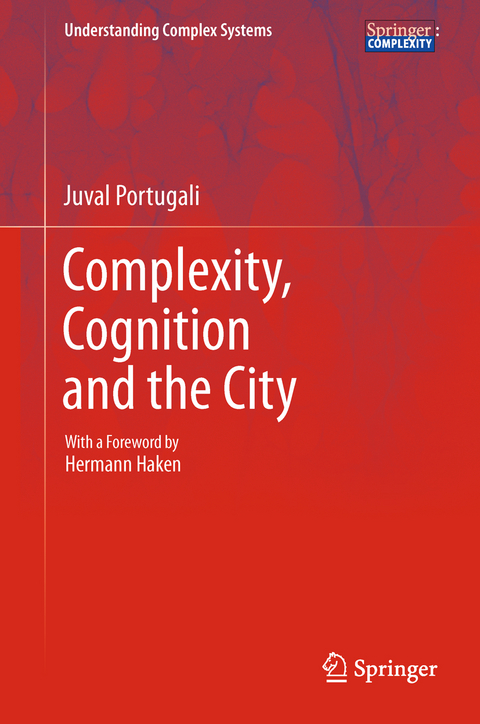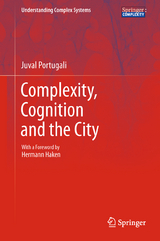Complexity, Cognition and the City
Springer Berlin (Verlag)
978-3-642-19450-4 (ISBN)
Complexity, Cognition and the City aims at a deeper understanding of urbanism, while invoking, on an equal footing, the contributions both the hard and soft sciences have made, and are still making, when grappling with the many issues and facets of regional planning and dynamics. In this work, the author goes beyond merely seeing the city as a self-organized, emerging pattern of some collective interaction between many stylized urban "agents" - he makes the crucial step of attributing cognition to his agents and thus raises, for the first time, the question on how to deal with a complex system composed of many interacting complex agents in clearly defined settings. Accordingly, the author eventually addresses issues of practical relevance for urban planners and decision makers.
The book unfolds its message in a largely nontechnical manner, so as to provide a broad interdisciplinary readership with insights, ideas, and other stimuli to encourage further research - with the twofold aim of further pushing back the boundaries of complexity science and emphasizing the all-important interrelation of hard and soft sciences in recognizing the cognitive sciences as another necessary ingredient for meaningful urban studies.
Foreword.- Preface.- Introduction.- Part I: The Culture of Cities.- The Two Cultures of Cities.- The First Culture of Cities.- The Second Culture of Cities.- Complexity Theories of Cities (CTC).- Complexity Theories of Cities Have Come of Age: Achievements, Criticism, and Potentials. Part II: Complexity, Cognition and the City.- Cognition, Complexity and the City.- SIRN - Synergetic Inter-Representation Networks.- Shannonian Information and the City.- Semantic Information and the City.- Notes on the Category 'City'.- Complex Artificial Environments.- Part III: Complexity, Cognition and Planning.- The Two Cultures of Planning.- Complexity, Cognition, and Planning.- Learning from Paradoxes about Prediction and Planning in Self-Organizing Cities.- CTC, Social Theory Oriented Urban Theory, and Planning.- A Self-Planned City.- Part IV: Complexity, Cognition and Urban Simulation Models.- Revisiting Cognitive Dissonance and Memes-Derived Urban Simulation Models.- CogCity (Cognitive City): A Top-down -> Bottom-up USM.- Pattern Recognition, SIRN and Decision Making.- Decision Making, Conflicts and Time in a Synergetic City.- Concluding Notes: Complexity Theories of Cities at the Gate of the 2010s.- Bibliography.
From the reviews:
"This book succeeds in bridging research fields which appear to be disconnected at first glance, and utilizes them to bring an in-depth understanding of cities and urban planning. ... this book provides new challenges and sets up the research agenda for urban scientists inspired by complexity ad cognition." (Emmanouil Tranos, Environment and Planning B: Planning and Design, Vol. 40, 2013)
"The latest book by Juval Portugali is a comprehensive volume covering the key themes and outputs of his recent work. The book covers a wide range of material related to methods of understanding and modelling the city. ... the book as a whole are likely to be of great interest. A wide range of material is covered and concisely tied together in a lucid and clear manner. ... the book has a lot to offer to those seeking to understand what a city essentially is." (Ashley Dhanani, The Journal of Space Syntax, Vol. 3 (1), August, 2012)
"I strongly recommend it to scholars who work on spatial agent models. ... The book starts from a presentation of the history of urban research, which revolves around the description of two cultures: first, the quantitative revolution in the theories of the City and, secondly, a structuralist-Marxist, humanistic approach. ... To sum up, this is a book well worth reading. Furthermore, it allows us to highlight certain limitations of social simulation in dealing with complex cognitive processes and complex system modelling." (Anne van der Veen, Journal of Artificial Societies and Social Simulation, April, 2012)
"The best part of the book probably consists of its rich, multicolored fireworks combining an unusually large and diverse spectrum of ideas from many disciplines, and leading to a broad and fresh vision. ... The book covers a vast amount of material. ... The most fruitful approach to Portugali's book probably is to allow oneself to be stimulated by the many interestingideas and the wealth of original insights ... ." (Cristian Suteanu, Journal of Regional Science, Vol. 52 (3), 2012)
| Erscheint lt. Verlag | 6.7.2011 |
|---|---|
| Reihe/Serie | Understanding Complex Systems |
| Zusatzinfo | XXIII, 412 p. |
| Verlagsort | Berlin |
| Sprache | englisch |
| Maße | 155 x 235 mm |
| Gewicht | 785 g |
| Themenwelt | Naturwissenschaften ► Geowissenschaften ► Geografie / Kartografie |
| Naturwissenschaften ► Physik / Astronomie ► Thermodynamik | |
| Sozialwissenschaften ► Soziologie ► Spezielle Soziologien | |
| Technik ► Architektur | |
| Schlagworte | complex artificial environments • complex theory of cities • Culture of Cities • self-organizing city • synergetic city • urban geography and urbanism • urban planning • virtual city |
| ISBN-10 | 3-642-19450-8 / 3642194508 |
| ISBN-13 | 978-3-642-19450-4 / 9783642194504 |
| Zustand | Neuware |
| Haben Sie eine Frage zum Produkt? |
aus dem Bereich




